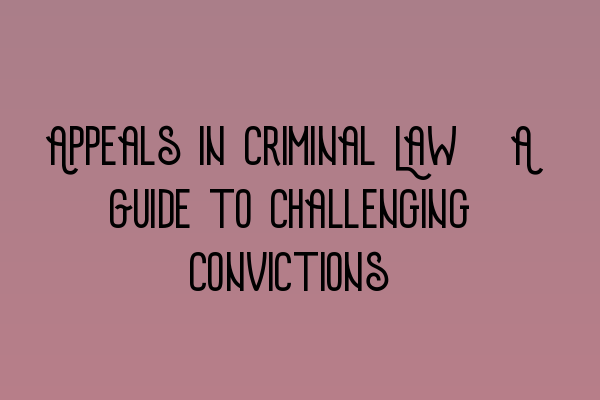Appeals in Criminal Law: A Guide to Challenging Convictions
When a person is convicted of a crime, it is not always the end of the road. The criminal justice system in the UK allows individuals the right to challenge their convictions through the appeals process. This guide will provide an overview of appeals in criminal law and discuss the steps involved in challenging a conviction.
The Grounds for Appeal
Before embarking on an appeal, it is important to understand the grounds on which a conviction can be challenged. Common grounds for appeal include:
- Inadequate legal representation
- Newly discovered evidence
- Errors in the judge’s directions to the jury
- Misconduct by the prosecution
- Procedural irregularities
- Incorrect application of the law
These are just some examples, and each case will have its own unique circumstances. It is advisable to seek the advice of a professional criminal law solicitor to assess the viability of an appeal.
The Appeals Process
1. Filing the Notice of Appeal: The first step in challenging a conviction is to file a Notice of Appeal with the appropriate court. This notice should outline the grounds for the appeal and any supporting arguments or evidence. It is crucial to adhere to the strict deadlines for filing the appeal, as failure to do so may result in the appeal being dismissed.
2. The Appeal Hearing: Once the Notice of Appeal has been filed, an appeal hearing will be scheduled. During the hearing, the appellant’s legal team will present their arguments and evidence to the appellate court. The prosecution will also have an opportunity to respond. The court will then review the evidence, consider the submissions, and make a decision.
3. Possible Outcomes: The appellate court has several options when deciding on an appeal. They can:
- Uphold the conviction and dismiss the appeal
- Quash the conviction and order a retrial
- Quash the conviction and acquit the appellant
- Substitute the conviction for a lesser offense
- Refer the case to a higher court for additional review
Each case is unique, and the outcome will depend on the specific circumstances and the strength of the arguments presented during the appeal hearing.
Seek Professional Assistance
Challenging a conviction through the appeals process requires in-depth knowledge of criminal law and expertise in appellate advocacy. It is crucial to seek professional assistance from a reputable criminal law solicitor who specializes in appeals.
If you are preparing for your SQE exams and need assistance, SQE Criminal Law & Practice Law UK offers comprehensive preparation courses for both SQE 1 and SQE 2. In addition, they provide SQE 1 practice exam questions and SQE 1 practice mocks (FLK1 and FLK2) to help you prepare effectively. Visit the following links for more information:
- SQE 1 Practice Exam Questions
- SQE 1 Practice Mocks FLK1 FLK2
- SQE 2 Preparation Courses
- SQE 1 Preparation Courses
- SRA SQE Exam Dates
By enrolling in these courses and utilizing the practice materials, you can enhance your understanding and improve your chances of success in the SQE exams.
In conclusion, appeals in criminal law provide individuals with an opportunity to challenge their convictions through a structured legal process. Understanding the grounds for appeal and following the appeals process diligently is crucial. Seek professional advice from an experienced criminal law solicitor to navigate the complexities of the appeals system effectively.
